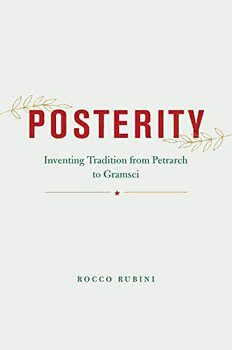Table Of ContentPosterity
Posterity
Inventing Tradition from
Petrarch to Gramsci
Rocco Rubini
The University of Chicago Press Chicago & London
The University of Chicago Press, Chicago 60637
The University of Chicago Press, Ltd., London
© 2022 by The University of Chicago
All rights reserved. No part of this book may be used or reproduced in any
manner whatsoever without written permission, except in the case of
brief quotations in critical articles and reviews. For more information, contact
the University of Chicago Press, 1427 East 60th Street, Chicago, IL 60637.
Published 2022
Printed in the United States of America
30 29 28 27 26 25 24 23 22 21 1 2 3 4 5
isbn- 13: 978- 0- 226- 80755- 3 (cloth)
isbn- 13: 978- 0- 226- 80772- 0 (e- book)
doi: https://doi.org/10.7208/chicago/9780226807720.001.0001
Library of Congress Cataloging- in- Publication Data
Names: Rubini, Rocco, author.
Title: Posterity : inventing tradition from Petrarch to Gramsci / Rocco Rubini.
Description: Chicago : University of Chicago Press, 2021. |
Includes index.
Identifiers: LCCN 2021024455 | ISBN 9780226807553 (cloth) |
ISBN 9780226807720 (ebook)
Subjects: LCSH: Petrarca, Francesco, 1304–1374. | Humanism—Italy. |
Italy—Intellectual life—Philosophy.
Classification: LCC DG442 .R77 2021 | DDC 851/.1—dc23
LC record available at https://lccn.loc.gov/2021024455
♾ This paper meets the requirements of ANSI/NISO Z39.48- 1992
(Permanence of Paper).
Dedicated to the memory of my prima,
my mother Virginia, and to the burgeoning life of my ultima,
my daughter Gemma . . . may our tradition live on . . .
I grandi uomini non si onorano né con statue, né diversamente; ma con rivelarne lo
spirito e farlo rivivere.
Francesco De Sanctis
C o n t e n t s
Acknowledgments ix
List of Abbreviations xiii
Introduction: Whole or Nothing 1
The Method: Hermeneutics between Gadamer and Betti 8
The Story: Humanism from Petrarch to Gramsci 20
1 Primi and Ultimi: Petrarch’s Corpus 29
Introduction: Total Petrarch, Different Petrarch? 29
“I was not born to be a slave of my body”: (Re- )writing the Past 37
Reading the Future 57
Including the Excluded: Petrarch’s Familiar Invectives 66
Conclusion 76
2 The Purpose of Literary Criticism: Francesco De Sanctis’s
(Anti- )Petrarchism 80
Introduction: Italian Petrarch, (Un- )congenial Petrarch 80
A Rhetorical Existence 91
“Going to the people”: Literary Criticism as Moral Philosophy 106
The Anti- Petrarch 123
Conclusion: Petrarch as Pharmakon 137
viii Contents
3 “Do not grow weary of reading, for I do not grow weary of writing”:
Goldoni’s Reform of Italian Literature 143
Introduction 143
Enough Is Enough: The Italian Comic Complex 145
Reforming . . . from Without 158
“With the mask I’m Brighella, without the mask I’m a man”:
Reforming . . . from Within 176
Conclusion: If Not Molière, Then What? 196
4 The Vichian Resurrection of Commedia dell’Arte:
Reciprocating Modernity between Italy and France 200
Introduction 200
Vico’s Laughter 208
Giving and Receiving Modernity: A Shared Vichism 215
“À quoi bon le théâtre italien?” 239
Conclusion 254
5 Remembering Is Not Thinking: Croce, Gramsci, and
Italian Intellectual Autobiography 256
Introduction 256
Beyond Laughter: For a “Reform” of Italian Thought 259
“A tall and blond Marx”: Antonio Labriola and Benedetto Croce 269
Rehearsing the Anti- Croce 287
The (Auto- )biography of a Nation 299
Conclusion 311
Conclusion: The Last Renaissance Man 313
Index 331
A c k n o w l e d g m e n t s
The present book follows The Other Renaissance: Italian Humanism between
Hegel and Heidegger (2014), as a second installment in a projected trilogy
dedicated to the regeneration of high- modern intellectual history in light of
its Renaissance and early- modern roots, a trilogy that I plan to conclude with
a (possibly multivolume) study of Giambattista Vico’s reception at home and
abroad.
Family, friends, and mentors were fully and gratefully acknowledged in my
first book, and I thank them again, here, alongside my savior and guardian
angel, Loredana, to whom I owe my sanity and well-b eing; Caterina, whose
sisterly affection rescues me daily; and Antonella, an acquired family member
and a life lesson in generosity. In dispatching my second monograph, I wish
to indulge in an additional acknowledgment that may come off as pretentious,
perhaps, but should be humored as the instinct of any intellectual historian or
literary critic (and I consider myself both): namely, I wish to thank my sources
or, as Vico would have it more fervently, my authors. Since my graduate stu-
dent days and unceasingly during the first part of my career as an educator
and scholar, Vico, yes, and also Francesco Petrarca, Carlo Goldoni, Francesco
De Sanctis, and Antonio Gramsci— to whom I have dedicated discrete under-
graduate courses, graduate seminars, and chapters in this study—h ave bro-
kered and informed my conversation with students near and far. I thank them
now, because, although I do not doubt that this conversation will continue and
will be mediated by them for some time to come, I apprehensively anticipate
that going public with these interpretations will alter our relationship in sig-
nificant ways.

